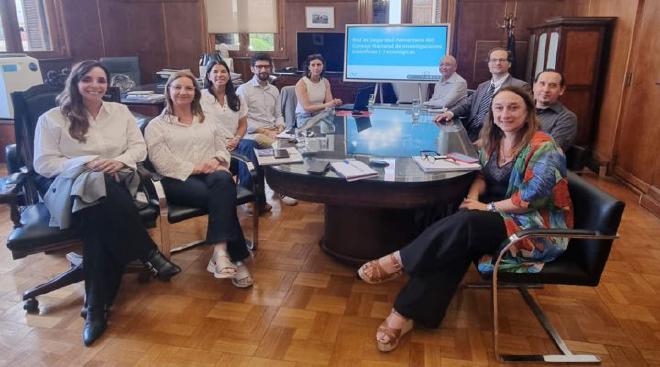

The Food Security Network of the National Council for Scientific and Technical Research (RSA-CONICET), through its director and researcher of the Council, Gerardo Leotta, presented in strategic meetings with the Ministry of Health, the Secretariat of Agriculture, Livestock, and Fisheries of the Nation (SAGyP), and the National Service of Health and Quality of Agro-Food (SENASA), the objectives, structure, actions, scientific tools, and also the guidelines for work and interaction with various institutions that manage risks related to food security of the Network.
Since its creation in 2015, the RSA-CONICET has received more than 50% of its requests from SAGyP and SENASA. Among the topics addressed, issues related to food quality stand out, including: food irradiation, antimicrobial resistance, the presence of heavy metals and allergens, and the control of pathogenic microorganisms. Specific inquiries were also included about products such as: stingless bee honey, artisanal cheeses, fish products, and yerba mate. Additionally, some actions aimed at animal health and public health were included, such as highly pathogenic avian influenza and the National Plan for Residue Control and Food Hygiene (CREHA).
In this context, the Secretary of Health Management, Saúl Flores, highlighted the strategic importance of the collaboration between the Ministry of Health and the Network: “The intention is to build and set a medium- and long-term agenda. The Network is the focal point in Argentina regarding food safety for Latin America. This collaboration is an additional contribution to defining public policies in the area of food.”
From the SAGyP, agronomist engineer Mercedes Nimo emphasized the contribution of the RSA-CONICET as a “key scientific and technical support for decision-making and for the definition and execution of fundamental public policies in the field.” She also highlighted that, “in response to the various needs of management agencies, the Network provides a quick response by informing the formation of work teams made up of expert professionals from across the country, which guarantees a federal perspective on each situation addressed.”
Contact [Notaspampeanas](mailto: notaspampeanas@gmail.com)

